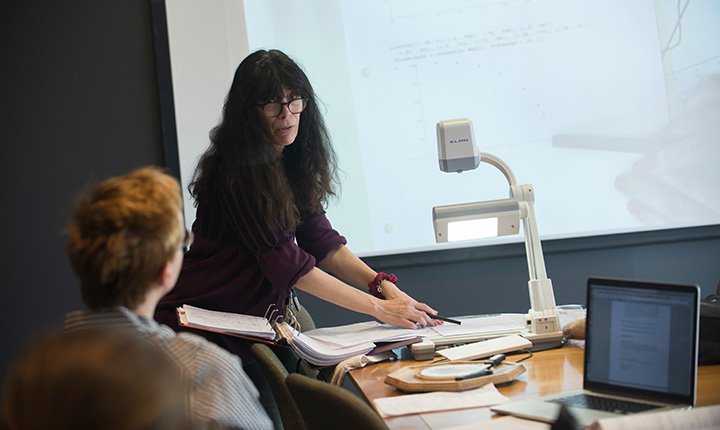Physicist Amy Graves Named American Physical Society Fellow

Graves was commended for her advocacy on behalf of underrepresented voices in physics, which has been a constant throughout her career.
The American Physical Society (APS) has honored Professor of Physics Amy Graves as one of its Fellows, a distinction bestowed upon no more than one half of one percent of the society’s membership each year. Fellowship recognizes members who have conducted original research that advances the study of physics, found innovative applications of physics, and/or made significant contributions in physics education.
“It means a huge amount to me,” says Graves, who was previously known professionally as Amy Bug. “I’m humbly grateful that what I’ve given up in order to do my work, what my children (now 22 and 28 years old) have endured, and the effort my husband makes to support my professional life, have culminated in this honor from the APS.”
Graves, whose research in soft-matter physics focuses on jamming, a transition between fluid-like and solid-like disordered states, was nominated by Morris L. Clothier Professor Emeritus of Physics Peter Collings, as well as other peers within the APS. Her nomination came through the APS Forum on Education. In her citation, Graves was commended for “extraordinary contributions to physics education, including creatively strengthening the teaching of computational physics and steadily engaging issues of gender and physics through presentations and publications.”
Graves’s advocacy on behalf of underrepresented voices in physics has been a constant throughout her career. She developed what may well be the first ever undergraduate course on Gender and Physical Science and is one of the few physicists with expertise in feminist science studies. Graves has been invited to speak on the subject across the country and in 2017 delivered a talk entitled “Women in Physics: Understanding and Overcoming Biases and Barriers,” the first Diversity and Inclusion seminar hosted by the University of Pennsylvania’s Department of Physics and Astronomy.
“Women are traditionally underrepresented in physics around the world, and progress has been especially slow for underrepresented minority groups in the U.S.,” says Graves. “Numbers are just the beginning of the story; there are important issues of job climate, fair evaluation, perceived success, and sense of belonging that are skewed by race and gender.”
Graves, who has taught at Swarthmore for more than 25 years, continues to co-author papers and talks with Swarthmore students and alumni. She recently submitted a grant proposal to the Division of Materials Research of the National Science Foundation with two co-principal investigators from Bucknell University and one from Swarthmore: Cacey Stevens Bester, the newest faculty member of the Physics and Astronomy Department.


